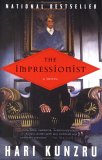Summary | Excerpt | Reading Guide | Reviews | Readalikes | Genres & Themes | Author Bio

Moti Lal gave in and now he has walked for weeks across country, the sweat running off his balding pate, while inside her palanquin Amrita lay still and had visions. Every day as he slips his feet into his dusty chappals, he finds it more absurd. He is a trusted man, a man with a position and a certificate, and he is trudging across country like a beggar. Every day as he squats for his morning evacuation, a thought bubbles up in his mind--that her will is stronger than his. The girl does not care if she dies. It is as if she is taunting him.
So maybe she deserves to be left there, in the rain and the cold. If she dies of exposure, it will be God's work. Then he can board the train and read a pamphlet and drink station chai out of a glass, knowing all this is behind him. He marvels that the slut, for all her stubbornness, will not even drag her carcass undercover where it is dry. For the water is pouring down with a strength he has not seen before, tearing out of the sky like blood from an open wound.
All the world is in the past. Now there is nothing but a torrent of white water rushing down a mountain, and the future is contained in that water, suspended in it like the tree trunks and thick red mud it has swept off the hillside. The water moves at an extraordinary pace, propelled downward as if by a great hand, and it rushes over the desert like an army, forced through narrow clefts in the earth until it arrives in the gully where Forrester kneels, wrestling a loose tent peg back into the slack wet ground. He looks up, and it appears in front of him, a huge white wall.
"Oh, God-" he begins, giving it a name. Then he is engulfed.
The palanquin smashes like a child's toy, and Amrita smiles as the night explodes into a vast rush, the force she has longed for since she can first remember. Camels bray and strain at their hobbles, turning end over end in the water as they try desperately to free themselves. Men and bags are sucked down, barreling along in the flood. For an instant Moti Lal keeps hold of his umbrella, standing bolt upright in roiling foam with a looks-like-rain expression on his face. Then he is swept under, and the umbrella goes skating off across the swell. As his lungs fill with water, he thinks with irritation about the expense of replacing it. Then, one more bead flicked across the abacus, one more column of figures completed with a stroke of the pen, he drowns. All the world is in the past.
This should be everything. Yet small miracles are woven into the pattern of every large event. Forrester finds himself snagged on something. White water screams around his chest but leaves his head clear, his mouth and nose free to breathe. When small hands clasp his wrists and help him up out of the flood, he ceases to understand what is happening to him. His consciousness is entirely adrift.
He scrambles up a slope and falls to his hands and knees, still reflexively gulping for breath. Gradually he realizes that he is somewhere dry and dark, and stands up. The mouth of a cave. Again, the touch of fingers. He recoils, then collects himself and allows his wrist to be grasped. The hand guides him farther in. He kneels down a second time, not entirely trusting his legs to follow orders. He tries to breathe more slowly. It is no good. When a fire flickers into existence, he is convinced that he has died.
The native mother goddess stands before him in the firelight, elemental and ferocious. Her body is smeared with mud. A wild tangle of hair hangs over her face. She is entirely naked. Kneeling, he flushes and averts his eyes, awed by the black-tipped breasts, the curve of the belly, the small tight mat of pubic hair. So much more real than the girls who populate his wakeful nights in the mountains. Those are picture postcard girls, flimsy as lace. They peep back over parasols, milk-white and rosy cheeked, asking, Oh will you not come into the garden my dear.
Reprinted from The Impressionist by Hari Kunzru by permission of Dutton, a member of Penguin Putnam Inc. Copyright © 2002 by Hari Kunzru. All rights reserved. This excerpt, or any parts thereof, may not be reproduced without permission.
Your guide toexceptional books
BookBrowse seeks out and recommends the best in contemporary fiction and nonfiction—books that not only engage and entertain but also deepen our understanding of ourselves and the world around us.